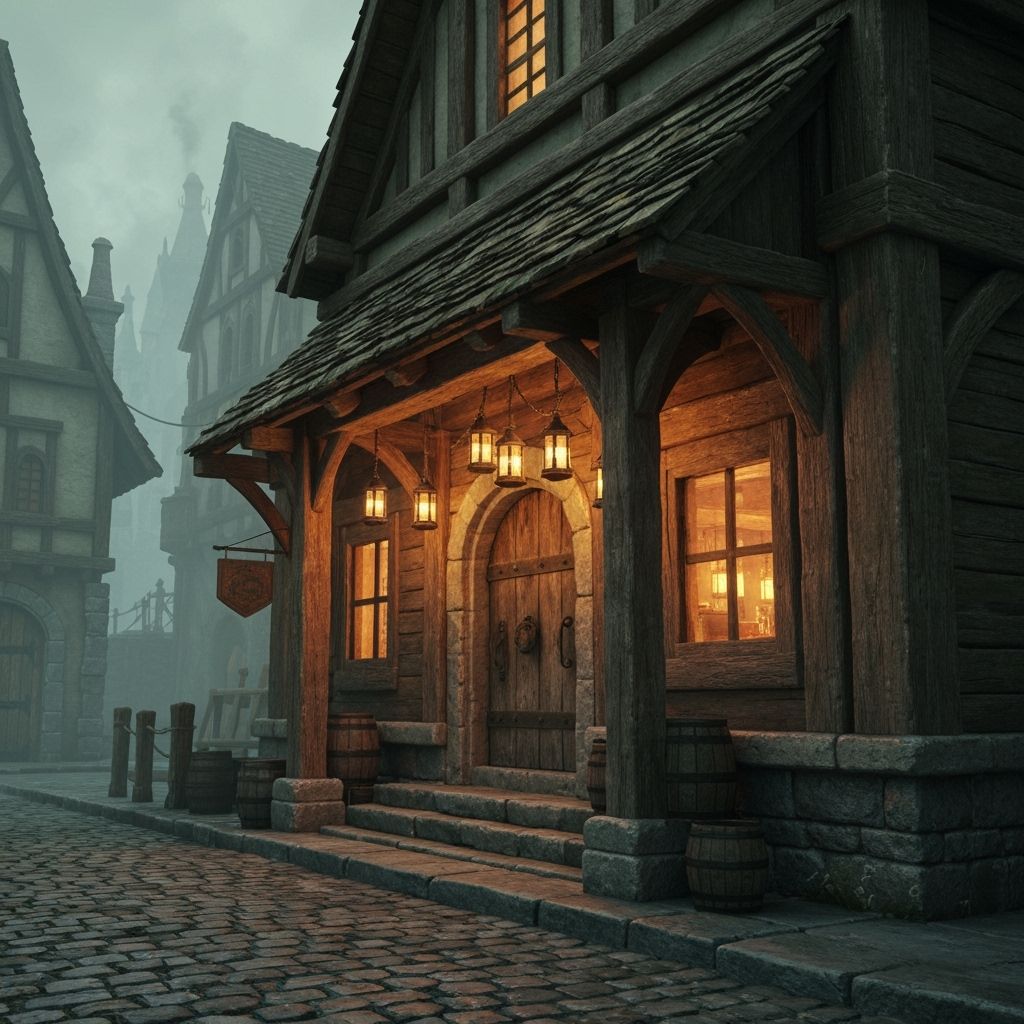The Lantern House Society
In the dusk-lit lanes of Old Port, where chimney smoke curls with strange mists and shapes drifting in and out, a sturdy wooden house stood with a lantern always burning at its door. They call it the Lantern House, not because it was a bright or soft place, but never once has the flame gone dark.
Overview
The Lantern House Society does not make a big name of itself, nor does it operate in the shadows. It is a steadfast charity devoted to aiding the poor and the helpless, those who drift between jobs, homes, and names. The first house of its kind is tucked between a worn bookshop and an apothecary on Wyrd Street in the Old Port district of Westmire in northern Couralis on the shores of Luthien Ocean. It's the kind of house that people tend to walk by a couple of times before noticing, even though the porch and windows are always bright with the soft glow of lanterns.
One of them is a small brass lantern that is refilled daily, which is said to have been used by railroad workers to guide them through tunnels. This light never goes out, not even in storms. That is the promise of the Lantern House Society. There is a rumour that the light only shines for the honest-hearted, which could explain the relative anonymity of such a relatively large society.
It provides shelter, letters of recommendation, and a sympathetic ear for those who need it. Donations are accepted in cash, books, and clothes. No one asks where you’ve come from until you’ve had at least one meal and a moment to rest. No one is ever turned away, though there is a price to be paid. A story, real or imagined, is the fee you need to stay.
History
In 1010 of the current age, the industrial port city of Westmire experienced a hard winter, which followed a total economic collapse. The collapse of local mills and a shipping strike left hundreds without work or housing. Municipal aid was limited, and the rulers in Solathra were slow to react. As a consequence, the workhouses were overfilled and alleys began to fill with growing numbers of the homeless and destitute.
Thaddeus Larkin, a retired schoolmaster, was among the first to act in any real capacity to save the people rather than the industry. Using his pension and a former boarding house he'd inherited from an uncle, he began to offer simple meals and a warm place to rest for those turned away elsewhere. He did not ask names, only offered a space, modest and uncomfortable as it could be, and a warm cup of tea and some broth. His only rule was that each person who crossed his threshold tell him a story.
If they wanted to pay with other means, he'd accepted the donation but insisted on the story. "A story," he used to say, "tells me more about a person than any name or occupation. How else can I help, if I do not know what they truly need?"
His quiet project drew the attention of Evelyn Spurmoore, a former investment officer whose family had lost its holdings when the bank collapsed the previous year. With a head for logistics and a distaste for charity driven by ego, sermon or profit, she helped structure the Boarding House into something sustainable. She created the society and connected it to food co-ops, anonymous donors, and other sympathetic civic groups who could lend a hand with the outreach programs and redistribution of able-bodied workers.
The pair renamed their project the Lantern House Society after the brass lamp that Thaddeus placed in the window, a sign to Westmire's forgotten that someone inside would let them in.
As word spread, first among itinerant workers, then through writers, clergymen, and dock workers, similar houses quietly appeared in cities along the coasts of both Oliria and Khorun until they also made their way inland.
These aren't franchises of the Society, though they borrow their name from the original house in Westmire. Some are founded by widow's guilds, others by retired constables, and social workers. A few were just a collection of rooms above bakeries or boats moored in a harbor. But each one bears a lantern in the window that is always lit.
There are an estimated 50 such houses across the world. All these houses communicate with each other, sharing practices, resources, struggles, and success stories with each other.

The original Lantern House in the Old Port district of Westmire, Couralis



Comments